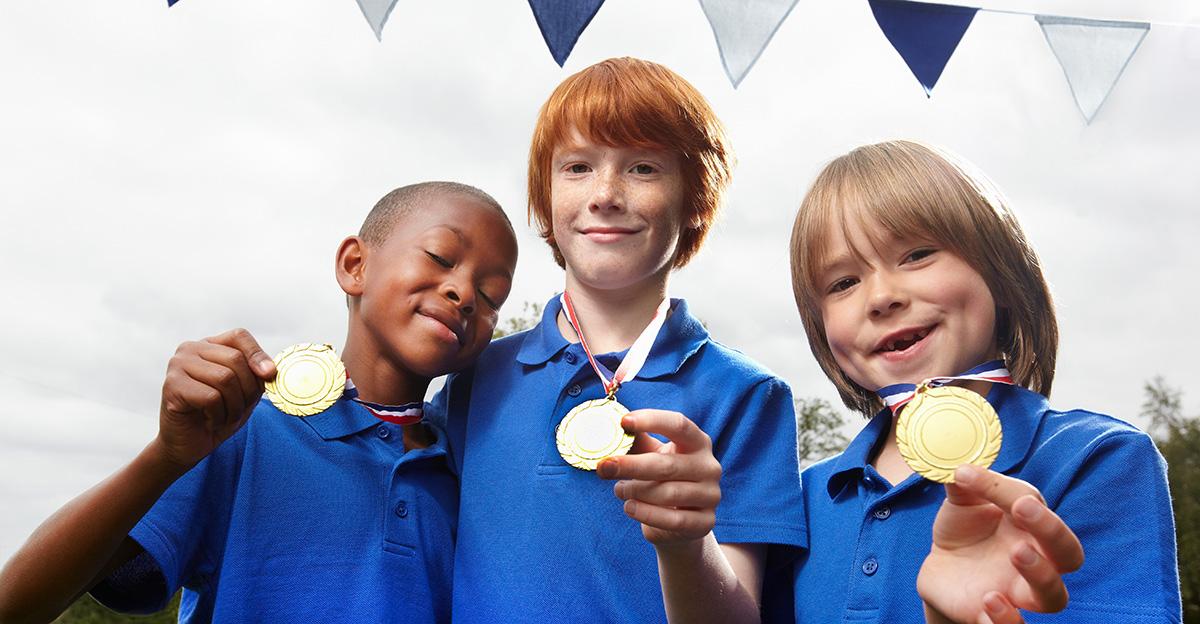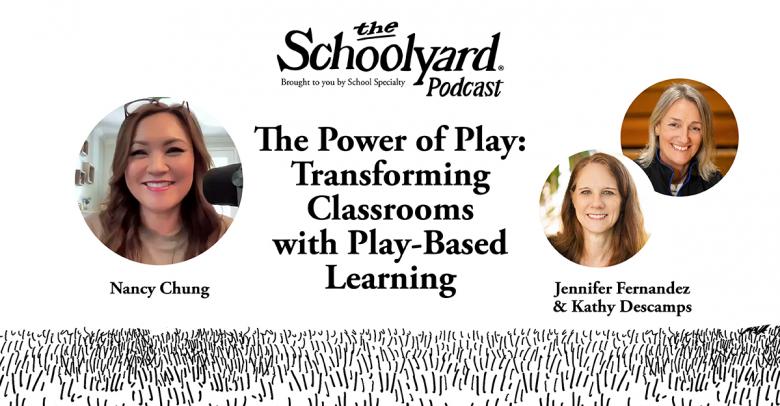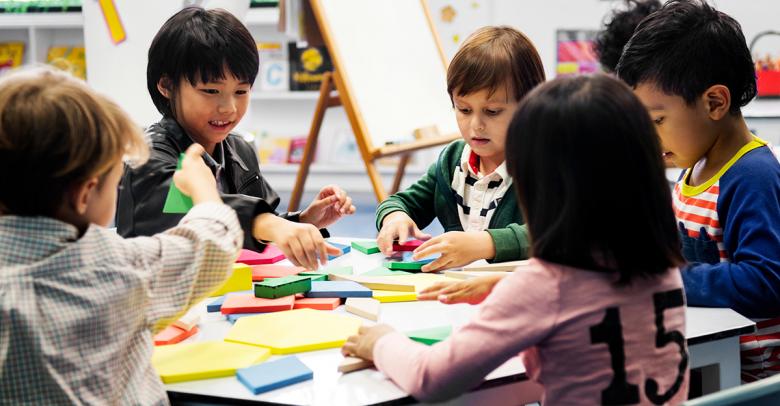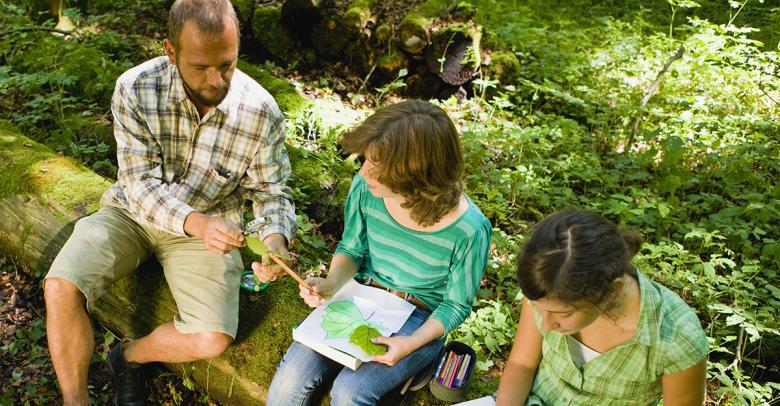The founder of the Modern Olympics, Pierre de Coubertin, had a dream that the Olympics and sports in general would make the world a better place. He wanted sports to be a right, not a privilege, for everyone. Now that the Olympics are on everyone’s mind—and television—it’s a great time to host a mini-Olympics at your school to embody the Olympic Creed!
The most important thing in the Olympic Games is not to win but to take part, just as the most important thing in life is not the triumph but the struggle. The essential thing is not to have conquered but to have fought well.
Pierre de Coubertin
Create a Vision of Your Mini-Olympics
The Olympic theme music plays as each class from Kindergarten on up enters the “stadium,” led by children carrying flags of their selected country. You see Greece, China, Brazil, Canada, Mexico, Great Britain, Jamaica, Kenya, Lebanon, Switzerland, India, and others marching in, class by class.
Students assemble up front as parents and community members in the audience listen to an inspirational guest speaker who represents the Olympic spirit. A large flag with “Citius, Altius, Fortius” (Faster, Higher, Stronger: the Olympic motto) waves above the crowd, challenging students to become the best they can be. Once the opening ceremonies are completed, let the games begin!
Plan Ahead for Volunteers and Inclusion
Schedule the games throughout the school day and involve all students, faculty, staff, parents, and community members. Prior to the big day, students choose three events from various choices. When not competing in an event, they can watch others and cheer them on. Events are run by parent volunteers, or you can ask students from a nearby high school, community members, local military personnel, or anyone else you think might be willing to donate their time.
Events can be drawn from the actual Olympics, or you can create your own. They should include various games to allow all students to have fun and feel successful. We also have some tips at the link below to help you make it an inclusive experience for all students.
Read More: Field Day Inclusion for All Students
Event Ideas
Below is a list of some event ideas from which to choose. The event should be run in heats by grade level, rotating through all the grades. It’s generally simpler to stick with mostly individual sports, so students move from one to the other independently and don’t need to coordinate with a partner or team. It’s also easier to include only events that are objectively measured (i.e. for distance or time), as opposed to subjective scoring (like gymnastics).
Track and Field
- 50-Meter Dash
- 400-Meter Run (or 1x around your “track”)
- 100-Meter Hurdles
- Softball Throw for Distance
- Long Jump (from standing still and/or running)
- 4×100-Meter Relay
- 3-Legged Race
Archery
- Shoot for Accuracy
Basketball
- Shooting Contest (H.O.R.S.E. or similar)
Fencing
- Pool Noodle Fencing
Pickleball
- Singles Tournament
2-Square Competition
- Singles Tournament
Kayaking
- Scooter Board “Kayaking” Race
Soccer
- Shots on Goal Competition
- Soccer Ball Juggling (number of touches in a row)
Other Creative Activities
- Hula Hoop Contest (duration)
- Obstacle Course (speed)
- Flying Disc Throw (distance)
- Beanbag Toss (accuracy)
- Jump Rope Contest (duration)
- Juggling 3 items (duration)
Get Down to Details
Obviously, this is not something you throw together over a weekend. There will be much planning and preparation that goes into putting on a successful event. You may start planning now, but hold your Olympics toward the end of the school year. Here are some details of how to make it successful and fun for all!
- Discuss your idea with the faculty and staff, and be sure to get buy-in from as many people as possible. Get a small planning committee together to help share the workload.
- Classroom teachers will need to be involved from the start. They may want to integrate Olympic-themed activities into their lessons.
- Allow classes to choose which country to represent well ahead of the planned day. You may want to provide a list to choose from.
- Solicit help from parents, staff, and members of the community (high school students, people from a local senior center, military personnel, local businesses, etc.) for the set-up, running of the events, and clean-up. Be sure you have enough volunteers for someone to run each event, as well as one or two “handlers” per station.
- Find volunteers to be event photographers and videographers to capture moments throughout the day. Afterward, you can use this footage on your school’s website or during Open House as a slideshow or video.
- Get donations for snacks, canopies (for shade), t-shirts for volunteers, large water containers, ribbons (if you choose to give them), etc. This needs to be done well ahead of time.
- Secure a guest speaker to give the inspirational speech to open the games. A local athlete who has been successful or overcame barriers is typically a great choice.
- Talk to the school nurse/health clerk to discuss things they need at a First Aid Station (first-aid kit, ice packs, a canopy, cot, chairs, etc.).
- Talk with nutrition services to discuss healthy foods and drinks they may be able to provide from the cafeteria.
- Create a schedule of events throughout the day. Be sure to have at least one event running for all grade levels at all times. When children choose their activities, they need to be aware of the schedule and not select two that are being done simultaneously.
- Using your event schedule, be sure you have plenty of equipment for each event. If you’re short, ask nearby schools if you can borrow equipment for the big day.
- Draw a map of where the events will take place. Then expand it and make posters to put up around the area so students can find their events.
- Write up the rules of each of the events. Make copies and place them on clipboards to pass out to all volunteers.
- If your area is large, secure walkie talkies or use cell phones for communicating with folks throughout the day.
Before the Opening Ceremonies
- Set up the track events and all the other events along the map. Place equipment at each event.
- Set up water stations, canopies, a sound system for music and announcements, a first aid station (with a school nurse and several volunteers), seating for parents and the community for the opening ceremony, extra trash cans, the events map, and individual signs to mark each event’s venue.
- Have volunteers arrive plenty early so you can talk to them about their specific event and about the Olympic Spirit. Let them know what is expected of them at their stations. If t-shirts for volunteers have been donated or purchased, give them their shirts. Choose a very bright color so they can be spotted more easily. Provide each with a full schedule of events with their station highlighted.
- Use the loudspeaker or other sound system to provide three-minute warnings of events that are starting.
- Set up the concession stand with water, healthy drinks, and snacks donated or brought from the school cafeteria.
- Have plenty of recycling containers around for students to place recyclables.
- Schedule a break in the middle of the day for students to rest and eat lunch.
- End the Olympics with a closing ceremony, a congratulatory speech to your mini-Olympians, and a thank you to all who helped make it possible. End with each class marching one last time around the track and back to their class, taking their chairs back with them.
- Utilize volunteers to help clean up the trash and recyclables and to return all equipment, the PA system, and canopies.
Follow Up the Next Day
Have a meeting with the committee to discuss how things went. Look for areas to improve for next time. This could become a yearly event. No need to wait every four years to have this much fun!






Heya.
In May we had a mini community event in order to raise money. Events included a bean bag toss. We also held a number of other competitions. Best wishes. The type of events ranged from a hook a duck to five a side football. See below for more event information. It was fun.
I included a variety of events in the schedule too. There was the usual sack race and a gymnastics show. I also served snacks to pass the entire time during the event. I then printed a numbered guest list to give out to the people who were attending the event in question. Other activities which we did were timed badminton and so on. Yet more of the events included a hopping skill display. Line dancing was fun. Tickets sold to cover the costs.
I got someone to deliver a timed class in rounders. To round things off I finished with a timed skipping event. I hired a ice cream van. I also made a lot of cupcakes and burgers to sell at the event. There was a soft drinks stall. People wore fancy dress or old costumes. I had a raffle and games as well. There was live music.
Great times. I hired a bike. We had a popcorn and candy floss table. Lots of pictures were taken.